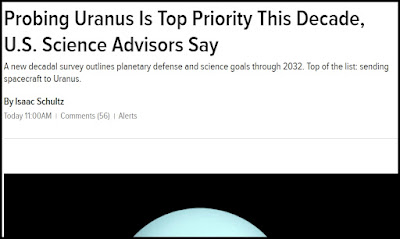Below the headline, we read this: "A new decadal survey outlines planetary defense and science goals through 2032. Top of the list: sending spacecraft to Uranus." What were these guys thinking? Uranus is a lifeless ball of frozen ice and gas of no relevance to any of the most interesting or important scientific questions.
We read this in the article (which conflicts with the headline):
" 'This recommended portfolio of missions, high-priority research activities, and technology development will produce transformative advances in human knowledge and understanding about the origin and evolution of the solar system, and of life and the habitability of other bodies beyond Earth,' said Robin Canup, an assistant vice president of the Planetary Sciences Directorate at the Southwest Research Institute and a co-chair of the survey’s steering committee, in a National Academies release."
Studying Uranus will not produce any "transformative advances," and Uranus will not be of substantial value in "understanding about the origin and evolution of the solar system, and of life and the habitability of other bodies beyond Earth." Uranus is a lifeless ball of ice and frozen gas, about the dullest planet imaginable. No one thinks there is any life on Uranus or any of its moons, because it's too cold where Uranus is.
Here is a photo of the extremely boring, featureless planet that is Uranus. Can anyone imagine a less interesting-looking planet?
Dull as dishwater: Uranus as seen by Voyager 2 (Credit: NASA)
(1) Uranus "is the only giant planet whose gravity data cannot
be fit by a simple 3-component model, with separate layers of rock, ice, and gas. Instead,
it requires more realistic mixed-density regions (Podolak et al. 1995)." So the planet would be kind of interesting to planetary gravity modeling specialists.
(2) Composition-wise, the "ice giants" such as Uranus and Neptune are different kind of planets from the "gas giants" such as Jupiter and Saturn, so let's study them for kind of "variety" reasons (a weak point).
(3) It's easier to get to Uranus than Neptune.
Reading the paper confirms my suspicion that Uranus is of zero interest to anyone who is not a scientist specializing in the planets of our solar system. There are 1001 interesting topics for scientific study that are not being funded because of factors such as these:
(1) Big-ticket research projects gobble up such a large fraction of the money allocated for science research.
(2) Today's scientists only want to do research that produces results in their comfort zone, and they avoid doing research in hundreds of promising areas, because they don't want to get results that might challenge their cherished materialist dogmas about the way reality works. So hundreds of experiments that would produce results of the greatest interest to the general public (or results of fundamental scientific importance) are not being funded, because our scientists are afraid of getting any result they might find to be too spooky or too upsetting to their belief system.
There should be three main criteria for funding scientific research:
(1) Fund scientific research which is useful and helps people.
(2) Fund scientific research that produces results that are very interesting to the general public.
(3) Fund scientific research that will have a reasonable chance of helping to produce fundamental breakthroughs or important corrections in human understanding about topics of life and mind.
The proposed Uranus mission fails on all three counts. The Gizmodo.com headline shown above sounded so strange that at first I thought its author must have got things wrong. But upon further investigation, I found the story is correct. Here is the source press release, saying, "The Uranus Orbiter and Probe (UOP) should be the highest priority large mission, the report says." A story here tells us the price tag for this boondoggle is more than 4 billion dollars. That money could fully fund many thousands of experiments that would all be of more importance than studying the frozen boring desolation of Uranus.
About a decade ago the same "decadal survey" recommendation group told us the most important space priority was to return rocks from Mars. The group also claimed back then that the second highest priority was to visit a moon of Jupiter called Europa (as you can see from page ES-4 of the file here). Inexplicably the group now deems Uranus as the top priority. Well, I guess that's one way to increase news coverage. Not many sources would publish a story with a headline such as "Scientists STILL are nagging us to return rocks from Mars."
NASA is a privileged fiefdom where people have somehow got the idea that they are entitled to many billions of dollars per year in funding, even for projects of very little value (like some billionaire's teenage son who believes he is entitled to a $5000 weekly allowance). If billions have to be spent on space, rather than wasting billions on low-value boondoggle projects (such as a Uranus orbiter or NASA's poorly-designed recent Mars mission), it would be better to spend such funds on useful space projects such as some system for protecting our planet from the very real danger of asteroid collisions or comet collisions that might make our planet all but uninhabitable. Or money could be spent on something that might have a big economic impact, such as space-based solar energy satellites or asteroid mining. A Uranus orbiter would have virtually no economic benefit. A full-scale search for extraterrestrial civilizations using radio telescopes and optical telescopes (combined with a full investigation of earthly UFO reports) is another billion-dollar project not yet done by NASA, which would be of vastly greater scientific interest and public interest than a Uranus orbiter.



No comments:
Post a Comment